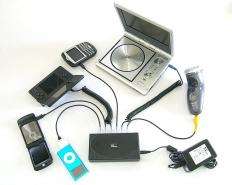E-Waste Policy is Complicated, Often Lax, Study Finds

(PhysOrg.com) -- In their evaluation of laws and public policy affecting the management of e-waste, Maya Abela and Jacob Campbell found that lax oversight and a lack of coordination are common.
A number of states are considering and approving legislation intended to reduce the amount of electronics headed for landfills.
Yet laws, regulations and recycling efforts often are confusing and uncoordinated, said University of Arizona alumna Maya Abela and Jacob Campbell, a current graduate student.
Abela and Campbell co-authored a report after evaluating state and federal government regulation of electronic waste, or e-waste. The two offered Tucson, Ariz. and exchanges along the U.S.-Mexico border as a case study, enabling an international perspective.
"It seems like such a burgeoning field, but very little has been talked about," said Campbell, a UA School of Anthropology doctoral degree student. "For how massive on a material level this issue has become, it seemed it was flying under the radar."
Also, what deems electronics to be waste versus a commodity and what is considered hazardous or not often remains largely a matter of perspective, both said.
The point is not to demonize the use of electronics, but to encourage the appropriate oversight of e-waste while emphasizing reuse and recycling among consumers and manufacturers, Campbell said.
The UA’s Udall Center for Studies in Public Policy published the paper, “E-wasted Time: The Hazardous Lag in Comprehensive Regulation of the Electronics Recycling Industry in the United States,” as part of its Environmental Policy Working Papers series in June.
The study earned Abela and Campbell the 2009 Lillian S. Fisher Prize in Environmental Law and Public Policy, an award the UA center grants for exemplary research.
The two noted that of greatest concern nationally:
• The electronics recycling industry in the U.S. "remains largely unregulated."
• Government regulation has not kept pace with industry self-regulation, which could lead to lax recycling practices. Abela and Campbell found that established standards "vary significantly."
• Self-regulation does not necessarily aid in international waste management efforts, which is contributing to the poisoning of certain populations and environments. The two noted existing cases in which businesses have wrongfully shipped used electronics abroad when they were meant to be recycled.
• All certification programs are currently voluntary, meaning that businesses recycling electronics need not be certified.
• The two cited a "regulatory disorder," noting that no state law attempts to regulate exported e-waste, and that the federal government’s attempt to reduce e-waste has been “remarkably limited."
The situation driving these concerns is quite pervasive.
The Consumer Electronics Association reported in 2008 that, on average, U.S. households contained 24 electronics, such as video game consoles, audio equipment, phones, televisions, computers, printers and scanners.
The most recent data reported by the U.S. Environmental Protection Agency noted that upwards of 2 million tons of electronics are disposed annually, with just less than 420,000 million tons being recycled. The EPA also reports that while electronics make up about 2 percent of the waste being sent to landfills, the amount is ever increasing.
"While more comprehensive regulation of e-waste and the electronics recycling industry in the United States has been arguably needed for years already, in the future it will be even more necessary that mechanisms exist to responsibly manage the waste stream," said Abela, who earned her juris doctor degree from the James E. Rogers College of Law last year.
At the UA, Abela took a law course with Campbell, and the two decided to pursue their paper on e-waste. Now a trial attorney with the U.S. Department of Justice’s Environment and Natural Resources Division, Abela said her views reflected in the paper are not represented by affiliated government agencies.
"The appropriate management of used electronics is an issue that is of increasing importance every day, as numbers of technology-users and rates of obsolescence increase," Abela said.
In the last decade, more than 20 states passed laws establishing recycling programs, with a number of other states considering legislation today, including Georgia, Pennsylvania, Utah and Arizona.
In their case study of Tucson, Abela and Campbell found that "dynamic networks of private, non-profit, and governmental actors" along the U.S.-Mexico border are making used electronics available to those in Mexico.
"Generally, this is a global issue, but we want this paper to have some local relevance because we have seen the broken TVs thrown into the washes and feel e-waste will increasingly be a challenge for Tucson," said Campbell, recently named a Fulbright Scholar. He will conduct fieldwork in Trinidad and Tobago on natural gas-based industrialization and narratives of sustainability.
He and Abela argue for more government oversight and uniform regulations among recyclers. Both said it also is important for consumers to be attentive to the issue and for manufactures and recyclers to form more coordinated efforts to curtail e-waste.
"Whether it is public relations or financial resources, the issue is not given attention to match the scale of the problem," Campbell said.
"There are good things being done," he added, "but there is not enough overarching oversight and regulation to link these different actors."
Provided by University of Arizona
















